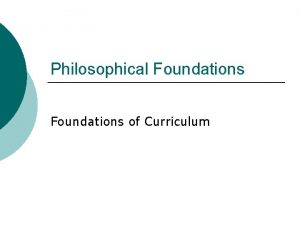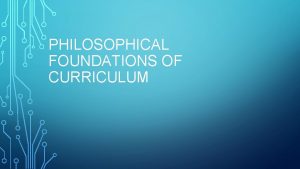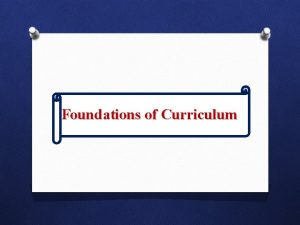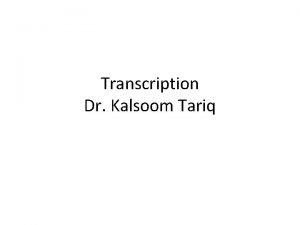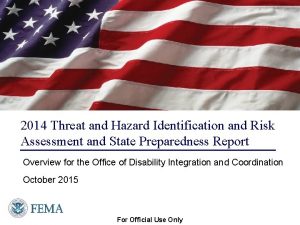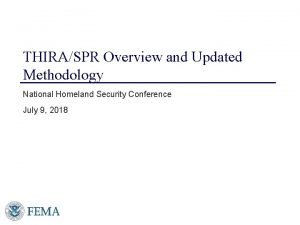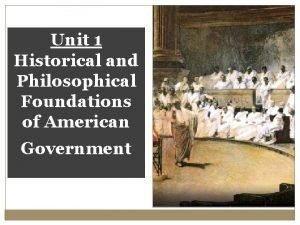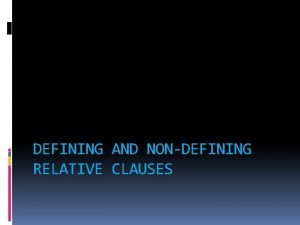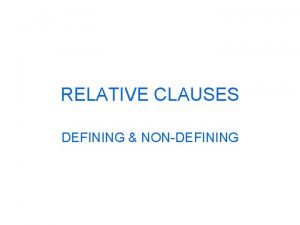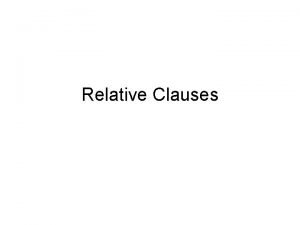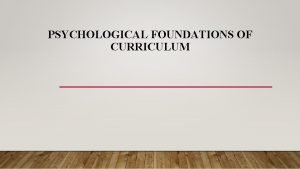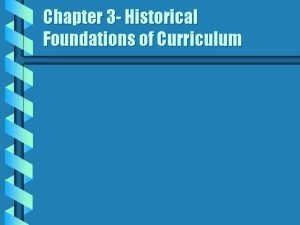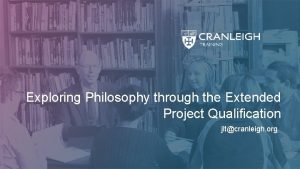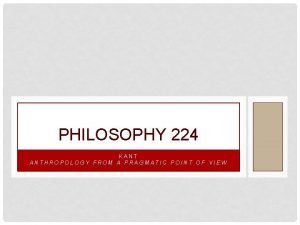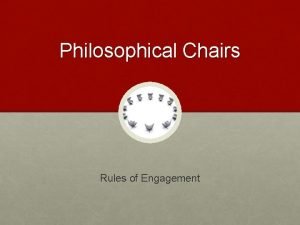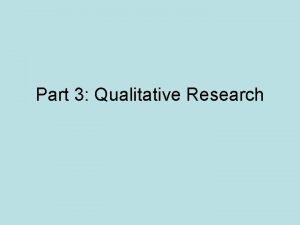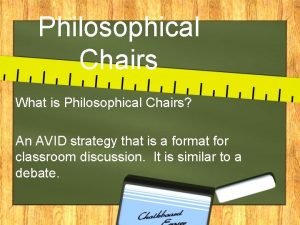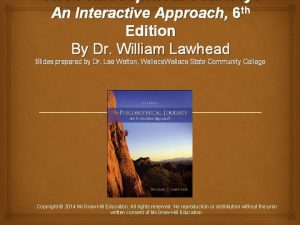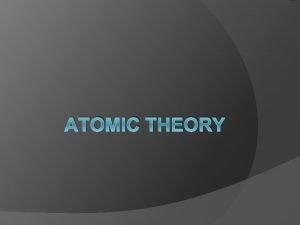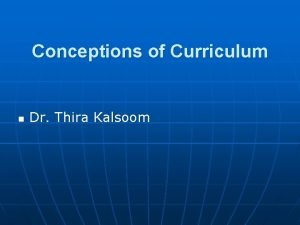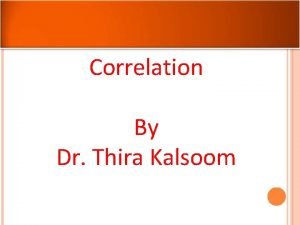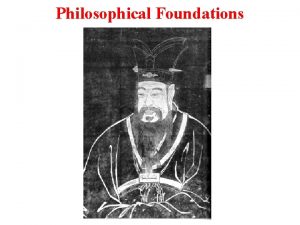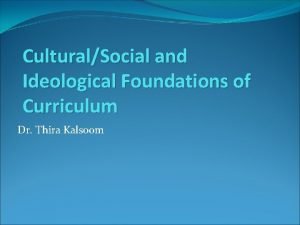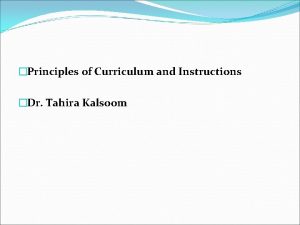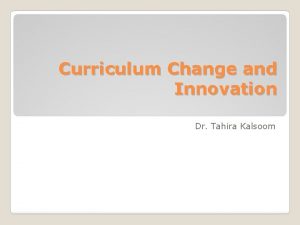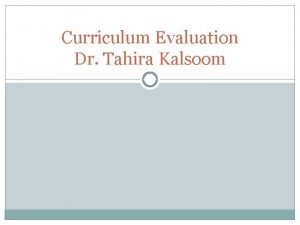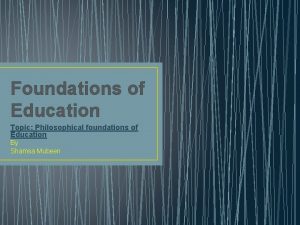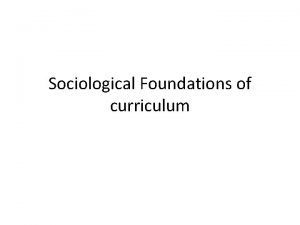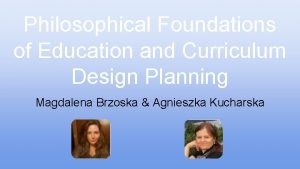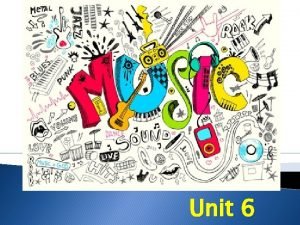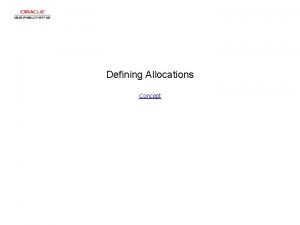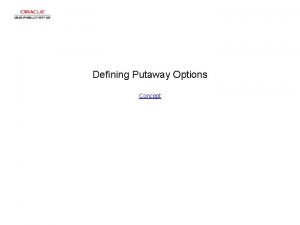Philosophical foundations of Curriculum Dr Thira Kalsoom Defining






















- Slides: 22

Philosophical foundations of Curriculum Dr. Thira Kalsoom

Defining Philosophy • A search for the wisdom of life • An attempt to understand the universe as a whole • An examination of our moral responsibility and our social obligations • An effort to fathom the divine inventions and our place with reference to them • The way we perceive the world around us • How we define what is important to us

What is a Philosophy? • Personal views of the "good life" based on one's own prior knowledge. • Two important facts about philosophy – It is a reflective or meditative activity. – It has no explicitly designated subject matter of its own but it is a method or type of mental operation that can take any area as its object.

Educational Philosophy • Ideas, attitudes, and beliefs about epistemology (nature of knowledge), society/culture, the individual, and learning. These foundational elements control the content and organization of the curriculum. • Our views toward these factors make up our philosophy of education.

Philosophical Considerations • Most lay people "adopt" a philosophy of life as it were by "osmosis" - from family, school, peer groups, church, and other components of the culture. • Frequently, this philosophy of life is unexamined and operates at an unconscious level. As a result, it often is found to contain irrational elements, incomplete ideas, and inconsistent beliefs. • Implicit and irrational as it may be, our philosophy represents a deeply felt commitment and is a powerful determinant in the decision-making process of every individual as well as of the society as a whole.

How does philosophy influence the curriculum? • It gives meaning to the decisions and actions of curriculum workers. • The philosophy of the curriculum worker is reflected in his/her work. • Their life experiences, common sense, social and economic background, education, and general beliefs about people are brought into and reflected through their work. • The philosophy advocated or reflected by a particular school or business and its officials influences its goals and content as well as the organization of its curriculum

Major Philosophical Views

Idealism • Emphasizes moral and spiritual reality as the chief explanation of the world. Truth and values are seen as absolute, timeless, and universal. It would teach the liberal arts to everyone (philosophy, literature, history, mathematics, and foreign language).

Realism • Stresses logic and lessons that exercise the mind and cultivate rational thoughts. It would teach the 3 Rs, science, and the arts.

Pragmatism • Emphasizes that knowledge is a process that is constantly changing. Knowing is considered a transaction between the learner and the environment. It would teach problem solving and critical thinking in an active learning environment.

Existentialism – Emphasizes individualism and personal selffulfillment. A person creates his/her own definition and in so doing makes his/her own meaning of life. Many critics feel that this philosophy has limited applications to K-12 schooling. • Philosophy becomes the principles for guiding action!

Philosophy becomes the principles for guiding action! • Do we provide educational programs that - develop a society or the individual? • Do we wish to make good citizens and workers? or • Do we want to make human beings who will live life to their fullest?

Organization of Philosophical Positions • Ontology - Nature of Reality • Epistemology - Nature of Knowledge (truth) • Axiology - Nature of Values (good)

Translated Educational Philosophies

Philosophies - Their beliefs and translation into education • • Realism Tradition Perennialism Idealism Conservative Essentialism Pragmatism Contemporary Progressivism Existentialism Liberal Reconstructionism

Perennialism -principals of knowledge are enduring - seeks everlasting truths -importance of time-honored ideas -great works of present and past -ability to reason -Focus of learning -Subject matter of disciplinary spiritual nature -Math, logic, great books -Learner is assumed to be a rational and spiritual person -Learning to reason is important

Perennialism (continued) -Curriculum - emphasize the 3 r’s in elementary levels - educating the intellectually elite at secondary levels -Great Books Program - associated with Robert M. Hutchins, Mortimer Adler - maintains that studying the works of the leading scholars of history is the best way to a general education

Essentialism -there is a common core of information and skills that an educated person in a given culture must have -3 basic principles: -Core of information -Hard work and mental discipline -Teacher-centered instruction -Back-to-basics -Focuses on 3 r’s -Draws equally from both idealism and relaism -Advocate the teaching of a basic core of information that will change

Essentialism (continued) -Focus of learning -transmit cultural heritage and develop good citizens -Curriculum -literature, history, foreign languages, religion -formal discipline -reading, lecture, memorization, repetition, examinations -teaching laws of nature and universal truths of the physical world -subject matter is the core of education -Criticized as obsolete in its authoritarian tendencies

Progressivism -Pragmatism -Charles S. Pierce -the meaning and value of ideas could be found only in the ideas’ practical results -William James -extended Pierce’s idea into a theory of truth -John Dewey -insisted that ideas must always be tested by experiment -gave rise to progressive education

Progressivism (contd) -Definition of progressivism -an educational theory that emphasizes that ideas should be tested by experimentation and that learning is rooted in questions developed by learners -favors human experience as a basis for knowledge -stresses programs of student involvement -emphasis on how to think -flexibility -encourages divergent thinking: moving beyond conventional ideas to come up with novel interpretations -curriculum is student-centered; experience-centered

Progressivism -Progressivism & Democracy -school must take on the task of improving the US way of life -progressivism is deemed a working model of democracy -freedom is explicit -Progressivism & Socialization -helps students learn how to manage change -criticized for putting so much stress on the processes of education that the ends are neglected -criticized that progressive educators have little personal commitment to anything
 Idealism philosophy
Idealism philosophy Philosophical foundation of curriculum
Philosophical foundation of curriculum What are the 3 foundations of curriculum?
What are the 3 foundations of curriculum? Rho factor
Rho factor Thira spr
Thira spr Thira/spr
Thira/spr Philosophical foundations of the american revolution
Philosophical foundations of the american revolution Defining and non defining
Defining and non defining Non defining relative clauses as sentence modifiers
Non defining relative clauses as sentence modifiers Defining and non defining relative clauses in telugu
Defining and non defining relative clauses in telugu Defining non defining relative clauses
Defining non defining relative clauses Defining vs non defining relative clauses
Defining vs non defining relative clauses Relative clauses defining and non defining
Relative clauses defining and non defining Psychological foundations of curriculum
Psychological foundations of curriculum Historical foundations of curriculum
Historical foundations of curriculum Philosophical epq questions
Philosophical epq questions Immanuel kant main ideas
Immanuel kant main ideas Philosophical chairs rules
Philosophical chairs rules Feature of qualitative research
Feature of qualitative research Philosophical exacting indifferent hysterical
Philosophical exacting indifferent hysterical Avid philosophical chairs
Avid philosophical chairs Read the philosophical journey: an interactive approach
Read the philosophical journey: an interactive approach Whats the atomic theory
Whats the atomic theory
